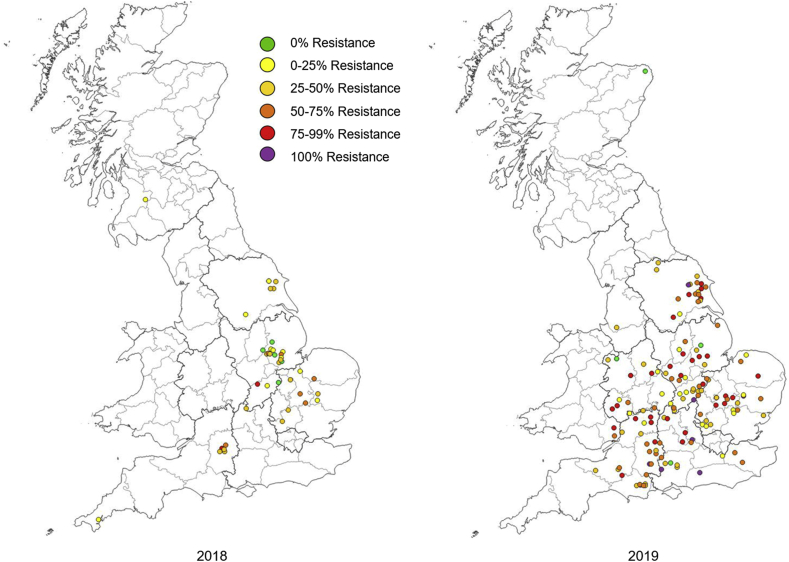
The role of pyrethroids in managing cabbage stem flea beetles (CSFB) has become increasingly contentious in recent years. Despite their widespread use, pyrethroids now offer limited (if any) success due to the prevalence of resistance within CSFB populations across England. This resistance has significantly diminished their effectiveness, leading growers and agronomists to question the suitability of pyrethroids as a long-term solution.
Moreover, concerns extend beyond efficacy, as these insecticides can adversely affect beneficial species, including natural predators and pollinators such as parasitic wasps. These non-target impacts risk disrupting the delicate ecological balance essential for sustainable agriculture.
It is essential to target – even avoid – sprays as much as possible, especially as cabbage stem flea beetle (CSFB) has developed resistance to pyrethroid insecticides (Source: AHDB website)
Speaking about the current pyrethroid situation lead crop protection scientist at the Agricultural and Horticultural Development Board (AHDB) Sacha White explains: “Pyrethroids provide limited success in controlling cabbage stem flea beetles due to pyrethroid resistance dominating in populations across England, raising serious doubts about their suitability to manage the pest. Beyond their reduced efficacy, these insecticides can also harm beneficial species, such as predators and pollinators, that naturally assist in managing pest populations.”
With resistance now clearly widespread, what is the point in spraying?, its costly and what damage are we doing to beneficials?
This sentiment is widely shared among United Oilseeds' farmer members and is a key area where United Oilseeds is actively investing to develop new options that offer members a practical and effective Integrated Pest Management (IPM) strategy.
Moving the science forward
In response to the current pyrethroid situation the latest OSR Reboot instalment showcases a collaborative effort between United Oilseeds, ADM Erith, Frontier Agriculture, Limagrain & a large end client to drive a new R&D initiative led by Fera Science.
The Enigma V project, part of the Enigma Series, targets the challenges posed by Cabbage Stem Flea Beetles (CSFB) in oilseed rape crops. According to Fera's Enigma Projects Director, Adam Bedford, the initiative seeks to translate the proven efficacy of combined botanical biopesticide products from the laboratory into practical, field-ready solutions.
Speaking to Senior Scientist at Fera, Hannah Fenton commented: “We’re very pleased to be helping push the OSR reboot agenda forward with the support of key industry partners including United Oilseeds who have been instrumental in seeking out Fera’s help for the Enigma V project.
“Our preliminary trials indicate that combining botanical extracts with pyrethroids could achieve up to 90% effectiveness in controlling CSFB, although we are still in the early stages. We're working through this project with the industry partners, testing different combinations and timings, and I am excited to see how this approach could translate into potential use in field trials.”
Talking about the project United Oilseeds managing director James Warner said: “I’m genuinely excited about the Enigma V project for several reasons. One of the most significant is the way it has united stakeholders from across the supply chain; spanning breeding, merchants, crushers, and end users. After some difficult years for OSR, this collaboration highlights the strong sense of partnership and shared commitment to the OSR Reboot campaign which will be central to finding solutions to achieve our aims and ultimately help British farmers grow oilseed rape successfully,”
James continues: “Beyond the collaborative spirit, the science behind this project is incredibly promising. If we can replicate the success Fera has demonstrated in glasshouse trials, there’s potential for a breakthrough solution that could effectively control CSFB and provide the much-needed boost for the UK’s OSR crop. The prospect of achieving this with higher efficacy and at a sharply reduced rate of pyrethroid application could be transformative, offering both environmental and economic benefits.”
With OSR Reboot initiatives already advocating for modifications to the SFI to include payments for flowering crops, combined with the potential of a new product offering up to 90% efficacy, the prospects for OSR could improve faster than anticipated.

Above: Pyrethroid resistance in P. chrysocephala in the UK for 2018 and 2019. Courtesy of Willis et al. (2020).
